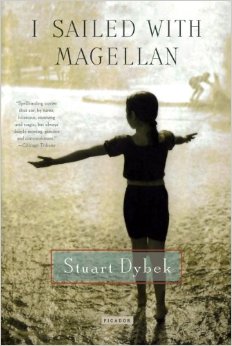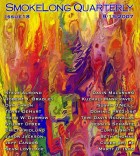Talk about the devolvement of intimacy in this piece. Why does reversing the tension factor, or omitting it all together, work?
I have a series of pieces like “Mole Man.” I think of them as overheard conversations—pillow talk—-several, but not all of them are set at night. Even those that aren’t take the form of pillow talk during the day. Pillow talk sans pillows. This particular piece hopes to tap into a certain playfulness. Two people who can entertain each other. A duet. I’m interested in the interaction of voices, and in that “Mole Man,” despite its brevity, seems closer to me to a play (or skit) than to, say, a prose poem.
“You mean you were just now lying there probably thinking, there’s leg-men and tit-men and ass-men and no doubt neck-men and shoulder-men and hair-men, and even soul-men, but I had to get involved with a mole-man?” Did you intend for this piece to be taken as humor?
I hope it’s playful. In the way that kids play, but even more, the way musicians use the word. Lovers improvising on a riff. I hope that besides the characters amusing one another, the piece is also amusing the reader.
You are well-known for your prize-winning fiction. Your work has been awarded the Lannan Prize, the Pen/Malamud Award, the Whiting Writer’s Award, a Guggenheim, numerous O. Henry Prizes, and several inclusions in Best American Fiction and Best American Poetry. How do you approach the blank page? When you set out to write, do you know beforehand what form your work will take?
In answer to your question about approaching the blank page, one might ask How blank is the page? Is there really nothing on it? Or is there already something there before a writer has written the first word? That first word, written (or read: in which case it’s the title) can be regarded as a transition out of silence. But often that first word is a verbalization of a fragmented story one has already told himself, or an image already perceived, something that immediately connects maybe to forgotten lines scribbled in a notebook five years earlier…you get the idea. There is usually some beforehand, and then writing it down invariably changes it with the very rare exception of those few times when writing seems almost like taking dictation. That’s great when it happens but one can’t sit around waiting for it.
What have you been up to since the SLQ editors last talked to you? Do you have any new projects in the works?
I’m working on several ongoing projects. Most, like a new collection of stories, are farther along than the last time I had work in SmokeLong. I’m also trying to work pieces such as “Mole Man” into a more dramatic format, adapt them for stage along the lines of a series of blackouts.
Since this is my first issue with SLQ, I thought it’d be appropriate to discuss firsts. Writing firsts. First time you called yourself a writer, first publication, first check. Those sorts of things. So, dish. What is your most memorable writing first?
There are so many ways in which to answer this question—and I can see that you are well aware of that by how you’ve posed the question. So, I’ll simply choose one of several options because it relates to the question you asked about the blank page. When I was in my mid-twenties I took a summer off from my job as a caseworker and tried to give myself more writing time. I wrote a story that summer called “The Palatski Man.” It wouldn’t be published for two or three years and when it was, it appeared in a sci-fi and fantasy magazine, not a lit mag. But that story took off in a direction that as the cliché goes “I couldn’t have imagined” (even though I apparently did) when I sat down to write. If I can credit myself with anything it was in allowing it to just go off on its own and following along rather than trying to exert some discipline over it.
Looking back I think that in trying to exert control over a story—which naturally is something that a writer who is still learning the craft is trying to do—I was following my models too closely, juxtaposing their voices over my own material as if that would give my stuff form. The price I was paying for trying to exert control, was not arriving at my own voice. Maybe on some nearly unconscious level I was beginning to realize that. Writing “The Palatski Man” had a liberating effect in that rather than trying to exert control, I was able to surrender to the story. It was a border I had to cross and it was also something I had to learn to do by allowing myself to do it. To exert control had required that I copy other writers. When I was finished writing “The Palatski Man,” I realized the story had taken me to a place I could have never gotten to without writing it. That’s the first I still feel the most indebted to.



 The core workshop of SmokeLong Fitness is all in writing, so you can take part from anywhere at anytime. We are excited about creating a supportive, consistent and structured environment for flash writers to work on their craft in a community. We are thrilled and proud to say that our workshop participants have won, placed, or been listed in every major flash competition. Community works.
The core workshop of SmokeLong Fitness is all in writing, so you can take part from anywhere at anytime. We are excited about creating a supportive, consistent and structured environment for flash writers to work on their craft in a community. We are thrilled and proud to say that our workshop participants have won, placed, or been listed in every major flash competition. Community works.